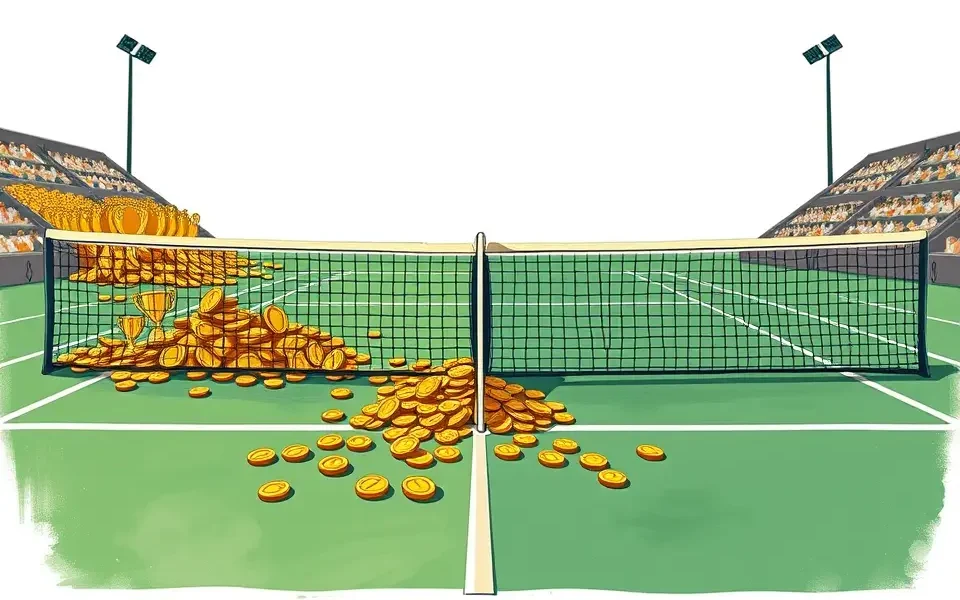The echoes of powerful serves and stunning victories on the court are now accompanied by strong voices advocating for a more equitable distribution of wealth in professional tennis. Led by prominent figures like Carlos Alcaraz, Iga Swiatek, Novak Djokovic, Jannik Sinner, and Aryna Sabalenka, a significant conversation is underway, pushing for changes in how prize money is allocated across the sport. This discussion encompasses not only equal pay for men and women but also a fairer distribution among all levels of players.
The Current Landscape of Tennis Prize Money
Tennis, a sport celebrated for its global appeal and thrilling competitions, has long faced scrutiny regarding its financial structure. While the top players enjoy lucrative endorsements and substantial prize winnings, many lower-ranked players struggle to cover their expenses.
Unequal Distribution
The prize money in tennis tournaments is heavily skewed towards the top performers. While winning a Grand Slam can bring in millions of dollars, players who are eliminated in the early rounds receive significantly less. This disparity creates a challenging environment for emerging talents and those who are working their way up the rankings. Recent data shows that a considerable percentage of professional tennis players barely break even, with travel, coaching, and equipment costs eating into their earnings.
Gender Pay Gap: A Lingering Issue
The fight for equal prize money for men and women in tennis has been a long and hard-won battle. Thanks to the efforts of tennis legends like Billie Jean King and the “Original 9,” major tournaments like the US Open, Australian Open, French Open, and Wimbledon now offer equal prize money to both sexes. However, disparities persist in other tournaments and endorsements, highlighting that the fight for complete gender equality is far from over.
Alcaraz and Swiatek Break the $30 Million Barrier
Carlos Alcaraz and Iga Swiatek have recently achieved a significant milestone, both surpassing $30 million in career prize money. This accomplishment underscores their dominance in the sport and highlights the potential financial rewards for top players. Alcaraz further cemented his status by recently exceeding $40 million after winning the Monte Carlo Masters in April 2025. Yet, their success also throws the existing inequalities into stark relief.
Voices for Change
Several leading players have been vocal about the need for a more equitable distribution of prize money in tennis. Their advocacy reflects a growing awareness of the challenges faced by many professionals in the sport.
Carlos Alcaraz
Carlos Alcaraz, the young Spanish sensation, has quickly become a prominent voice in the discussion about fair prize money. His meteoric rise to the top has given him a platform to advocate for change. Alcaraz emphasizes the importance of supporting young and emerging players, arguing that a more equitable distribution of funds would help them sustain their careers and invest in their development.
Iga Swiatek
Iga Swiatek, the Polish world number one, has consistently spoken out about the need for equal opportunities and fair compensation in tennis. Swiatek has highlighted instances where discrepancies in prize money persist between men’s and women’s tournaments of comparable status. She champions the cause of ensuring that female players receive the recognition and financial rewards they deserve.
Novak Djokovic
As one of the most influential figures in men’s tennis, Novak Djokovic’s views on prize money carry significant weight. While Djokovic has sometimes faced criticism for his stance on certain issues, he has generally supported efforts to ensure fair compensation for all players. He advocates for a system that rewards excellence while also providing a safety net for those lower down the rankings.
Jannik Sinner
Jannik Sinner, the rising Italian star, has also joined the conversation, echoing the sentiments of his peers. Sinner, who recently entered the elite club of players with over $30 million in career prize money, understands the financial pressures faced by many players striving to make their mark. He supports initiatives that promote a more sustainable and equitable financial model for professional tennis.
Aryna Sabalenka
Aryna Sabalenka, known for her powerful game and outspoken nature, has been a strong advocate for fairness in women’s tennis. Sabalenka has called for greater transparency in how prize money is allocated and has supported efforts to address the remaining gender pay gaps in the sport. She believes that equal opportunities and fair compensation are essential for attracting and retaining talent in women’s tennis.
The Case for Change
The arguments for a more equitable distribution of prize money in tennis are compelling, touching on fairness, sustainability, and the overall health of the sport.
Promoting Fairness
At its core, the call for fairer prize money is about promoting fairness and equal opportunities. Many argue that the current system disproportionately rewards those at the top, while leaving many struggling to make a living. By redistributing some of the wealth, tennis can create a more level playing field, where talent and hard work are the primary determinants of success, rather than financial resources.
Ensuring Sustainability
The long-term sustainability of professional tennis depends on ensuring that players at all levels can afford to compete. Without adequate financial support, many promising athletes are forced to abandon their dreams, depriving the sport of potential stars. A more equitable distribution of prize money would help to alleviate this problem, allowing more players to pursue their careers without facing constant financial strain.
Enhancing the Sport’s Appeal
A fairer financial model can also enhance the overall appeal of tennis. By supporting a broader range of players, the sport can foster greater diversity and create more compelling storylines. Fans are more likely to engage with a sport where they see opportunities for players from all backgrounds to succeed, making tennis more vibrant and inclusive.
Potential Solutions
Addressing the issue of prize money distribution in tennis requires a multi-faceted approach, with various solutions being proposed and debated within the tennis community.
Reallocating Prize Money
One potential solution is to reallocate prize money, increasing the amounts awarded in the early rounds of tournaments while slightly reducing the sums given to the winners. This approach would provide a financial boost to lower-ranked players, helping them cover their expenses and invest in their development.
Creating a Player Fund
Another idea is to create a player fund, financed by a percentage of tournament revenues and endorsement deals. This fund could provide grants and subsidies to players who meet certain criteria, such as ranking or financial need. Such a fund would offer targeted support to those who need it most, helping them overcome financial barriers to success.
Promoting Sponsorship Opportunities
Efforts could also be made to promote sponsorship opportunities for a wider range of players. Currently, most endorsement deals go to the top stars, leaving many others struggling to attract sponsors. By actively marketing lesser-known players and highlighting their stories, tennis organizations can help them secure the financial backing they need to sustain their careers.
Merging ATP and WTA
Some, like Andy Murray and tennis legends such as Billie Jean King, Chris Evert and John McEnroe, have suggested that a merger between the ATP (Association of Tennis Professionals) and WTA (Women’s Tennis Association) could be beneficial in achieving true equality. Unifying the tours could lead to more streamlined operations, combined sponsorship deals, and ultimately, a more equitable distribution of resources.
Historical Context: The Fight for Equal Pay
The current debate over prize money distribution is rooted in the historical struggle for equal pay in tennis. The “Original 9,” led by Billie Jean King, famously protested the unequal prize money in the 1970s, laying the groundwork for the changes that followed. King’s unwavering advocacy led to the US Open becoming the first major tournament to offer equal prize money to men and women in 1973.
Billie Jean King’s Legacy
Billie Jean King’s impact on tennis extends far beyond her achievements on the court. Her activism paved the way for future generations of female players to demand and receive equal treatment. King’s famous quote, “Unless I was number 1, I wouldn’t be listened to,” encapsulates her determination to use her success to drive change.
The “Original 9”
The “Original 9” were a group of courageous women who risked their careers to stand up for equal rights in tennis. By signing $1 contracts to play in a separate women’s tournament, they demonstrated their commitment to fighting for fairness and creating opportunities for future generations.
Looking Ahead
The ongoing conversation about prize money distribution in tennis is a positive sign, indicating a growing recognition of the need for change. With influential players like Alcaraz, Swiatek, Djokovic, Sinner, and Sabalenka lending their voices to the cause, there is reason to believe that meaningful progress can be made.
The Role of Governing Bodies
Ultimately, the responsibility for implementing change lies with the governing bodies of tennis, including the ATP, WTA, and the International Tennis Federation (ITF). These organizations have the power to enact policies that promote a more equitable distribution of prize money and create a more sustainable financial model for the sport.
A Continuous Effort
Achieving true fairness and equality in tennis will require a continuous effort, with ongoing dialogue and collaboration between players, administrators, and sponsors. By working together, the tennis community can create a sport that is not only thrilling to watch but also fair and inclusive for all who participate.
The push for fairer prize money in tennis reflects a broader movement towards equity and social justice in sports and beyond. As the debate continues to evolve, it is essential to recognize the importance of creating a level playing field where all athletes have the opportunity to thrive.








No Comment! Be the first one.